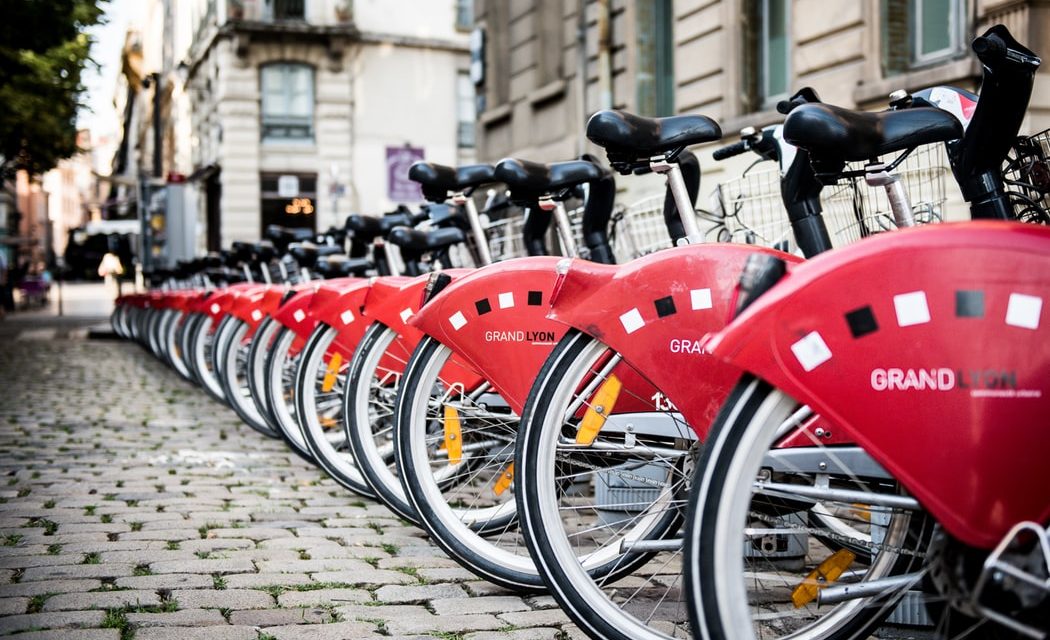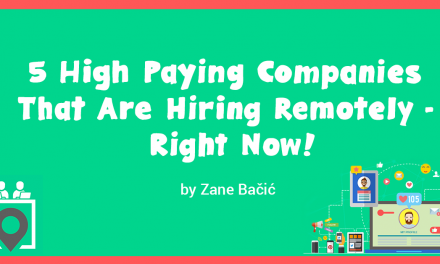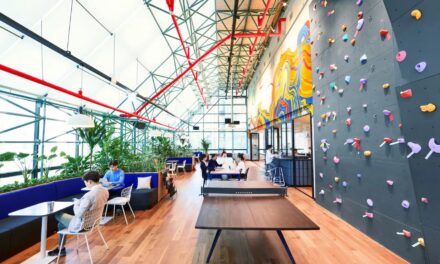The past decade has seen the rise of the sharing economy across a wide range of global industries, both old and new. Be it the Ubers and Airbnbs, who’ve taken the world by storm, or the many coworking spaces and shared kitchens that have been slowly but surely popping up in cities near you, the sharing economy is certainly here to stay.
Studies have shown that this new economic model has no plans of slowing down anytime soon, with revenue from the sharing economy expected to double by 2022 and reach an upwards of 86.5 million users by 2021.
What is the sharing economy?
The sharing economy is a peer-to-peer based economic model that takes one person’s asset and lends it to another, allowing them to use this asset on an ad-hoc basis. This benefits both parties, as the owner earns money from the idle asset and the consumer gains access to the asset for substantially less than if they had to purchase it themselves.
Why is the sharing economy important?
The sharing economy often operates in high-value, capital-intensive industries, such as housing or travel. It’s a lot easier to rent someone a car than it is to rent them a pen. The reason for this is accessibility. While most people can afford to buy a pen outright, not everybody could buy a car (and nor do they want to). Sharing is cost-effective, and the market has noticed that.
Examples of the sharing economy

Photo from Getaround
Car Rental
Take car rental — an age-old hassle for holidaymakers and travelers around the globe. Companies like Getaround are taking all the stress out of getting around by providing a refreshing and spontaneous approach to travel.
As early entrants in the sharing economy, Getaround saw the opportunity to connect cars with drivers. At the tap of a button, and at a very affordable price, riders can find cars nearby and drive away within minutes. The process is incredibly simple, and both owners and users benefit from the transaction.
Accommodation
Other benefits of the sharing economy can be seen in industries like accommodations and home rentals. Badi, founded in 2015, has provided a platform for homeowners to directly connect with tenants looking for both short-term and long-term accommodation. It makes little sense to have an asset like a vacant apartment if you travel often for business, so renting the apartment benefits both parties.

Photo from Tulerie
Clothing
Even the clothing industry is active in the sharing economy, with companies like Tulerie and Rent My Wardrobe connecting pre-loved fashion with temporary owners. It’s allowing people to make money off of once-idle assets. On all of these platforms, you can be a buyer and a seller at the same time.
The possibilities are endless, and the price comes in a lot cheaper than purchasing the asset itself. After all, cheap flights only go so far if you have to buy an apartment and a car in the city you’re visiting.
However, there’s one model in particular that currently has the attention of investors and highlights all of the benefits of the sharing economy. Corporate space, more commonly known as coworking space, is a fantastic example of why the future is “co.”
Coworking spaces and the sharing economy
Shared cars, apartments, and clothes all provide the user access to expensive assets for a smaller price tag. The same applies to coworking, where it’s much easier for business owners to rent a shared office space than it is to kit out a commercial space for your team. For startups and entrepreneurs, the low cost for high-end office space has proved extremely attractive.
No matter which end of the coworking price spectrum an individual or team lies upon, they will save a significant amount of money in comparison to renting their own commercial space. In fact, if your team consists of less than 30 people, coworking spaces are 60-75 percent more cost-effective than traditional office spaces.
This is mostly due to not having to start from scratch or spend on tech infrastructures and is one of the most attractive aspects of coworking — and the sharing economy — for many.
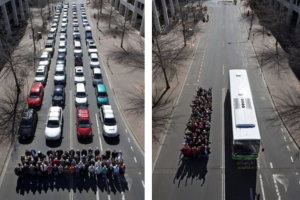
Photo from Green Groundswell
Coworking spaces are more environmentally-friendly
As the pressure to adopt green practices mounts, not only in corporate business but also on an individual level, people are often seeking more sustainable ways to live and work. Sharing assets is a surefire way to achieve this, and we find a great case study in public transport.
A total of 48 people can travel on one transit bus which, in comparison to 48 cars, has a minimal environmental impact. Purchasing a bus ticket facilitates the temporary use of public transport in the same way that a coworking membership facilitates a month of fully-equipped office space.
Just like public transport, coworkers share the same facilities and can access a wide range of amenities at a significantly less cost to the environment.
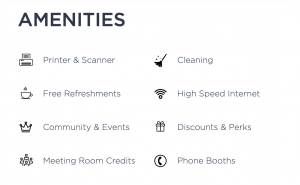
Photo from OneCoWork
Beyond the world of work, there are so many other industries undergoing changes to reduce their environmental impact. Fashion, especially fast fashion, is notorious for being detrimental to the environment.
Business Insider reports that the fashion industry produces 10 percent of all of humanity’s carbon emissions, is the second-largest consumer of the world’s water supply, and pollutes the oceans with microplastics. This hasn’t gone unnoticed, and slowly but surely the sharing economy is providing solutions to the eco-friendly issues in the fashion industry and beyond.
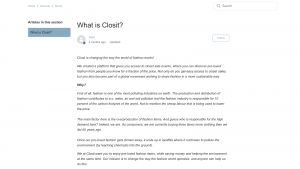
Photo from Closit
For example, Closit is making preloved fashion more accessible and consumers more conscious of how fashion affects the world around us. Their marketplace, specifically for clothing, was established with the intention of connecting people with local fashion to reduce the fashion industry’s carbon footprint.
Coworking creates incredible communities
Community is somewhat of a buzzword currently, and this is partly to do with the sharing economy. Everyone is trying to create an appealing community, and everyone is convinced that theirs is the best. This comes as no surprise, considering community is essential for growth in this environment.
The sharing economy has essentially brought together a lot of people, who often share common goals or interests, into the same place. Naturally, communities have emerged with communication spearheading their success.
The sharing economy, and everyone within it, benefits from these communities where they exchange information and knowledge in a way that hasn’t been possible until now.
Nowhere is this as apparent than in a coworking space, where one of the main attractions is undeniably the networking opportunities made possible by the space’s community. Curated events in these shared spaces provide the perfect avenue to expand your professional and .
The communities created in coworking spaces also serve as an incredible talent pool from which larger corporations are more frequently fishing. Beyond the startup teams and individual entrepreneurs, coworking has become increasingly popular with big companies who are eager to capitalize on this aspect of the sharing economy.
Being surrounded by fresh and motivated talent is appealing to big corporations, who can often find themselves distanced from the working world of younger talent.

Photo from OneCoWork
However, community isn’t just about networking and employment opportunities; it’s also about a sense of belonging. It’s no longer about the easiest viable option; it’s about providing an enjoyable experience for these communities so as to reap the benefits later on.
These communities have been built from the inside out and are only as strong as their weakest link.

Photo from Badi
Coworking is super flexible
The flexibility of the sharing economy is one of its greatest strengths and most attractive attributes. Being tied down by 12-month contracts is a thing of the past, with most companies in the sharing economy embracing month-by-month subscriptions or memberships. This has ultimately created an environment where uncertainty isn’t a problem, with extensions and cancellations being easy and transparent.
Coworking is especially flexible, as it allows for changes to your team or business to be accommodated easily and relatively quickly. The last thing anyone wants to be worrying about is whether there are enough desks for all of the new team members that their growth has driven them to hire.
In traditional workspaces, rapid growth can be difficult to keep up with. Needing to arrange new office spaces, furniture, and bills distracts from the task at hand — capitalizing on the success of the business.
Coworking spaces offer offices for big teams and little teams alike (and for all those teams in between).

Photo from OneCoWork
Outside of office space, some companies are even offering their services on an hourly basis, facilitating spontaneity and impulsivity no matter your plans. Getaround, for example, allows you to rent a car for as little as one hour at a time, and they don’t charge a minimum fee for doing so.
The sharing economy moving forward
We shouldn’t be too quick to brand everything that attracts a young crowd as sharing economy, but the benefits and ideology are certainly spilling over into other, more hierarchical industries. Not everything is black and white in the sharing economy, and there are many companies, both new and old, embracing parts but not all of it.
The housing industry, which is historically known for being inflexible, is making changes to the way it does business outside of the sharing economy. What used to be a long and binding commitment is now quick and flexible, free from the hassle of long-term contracts.

Photo from ShBarcelona
In accommodation, ShBarcelona offer year-long rentals, month-by-month rentals, and rentals by the day, taking the flexibility of the sharing economy and applying it for the benefit of tenants and homeowners alike. More individuals are being catered to than ever before, with professionals and students being afforded similar flexibility as tourists arriving in the city for just a few days.
ShBarcelona has also built a community through their regularly updated and information-rich blog, which acts as a useful city guide for their users. Estate agents aren’t just suits and ties pointing toward a dotted line anymore — rather, they’re embracing the positive changes.
The same can be said for the car rental industry. Founded in 2015, Virtuo launched with many of the benefits of the sharing economy built into its business model. The company offers an app-based, incredibly flexible car rental service that skips the hassle of traditional rental agencies. A fleet of fully-insured luxury cars are the tap of a button away from drivers everywhere.
Wrapping up
Overall, the sharing economy has made life a lot easier and more cost-effective. Companies everywhere are trying to integrate the benefits of this innovative economic model into their own business strategies, and many new ventures are popping up within the industry to reflect this drive.
Co-living, co-riding, coworking — they’re all steps toward more flexible, affordable, and environmentally-friendly lifestyles. They’re revolutionizing traditional industries and making goods more accessible to more people for less. The Future of Co, in terms of working, living, riding, and more, is bright.
If you’d like to learn more about the future of the sharing economy, Coworker will be represented at The Future of Co Summit being held at OneCoWork Barcelona. We’ll be joined by the likes of Badi, Reby, and Closit to discuss the micro-changes we can all make to promote a greener world. Check out the event page for more speakers and details on how to attend.




